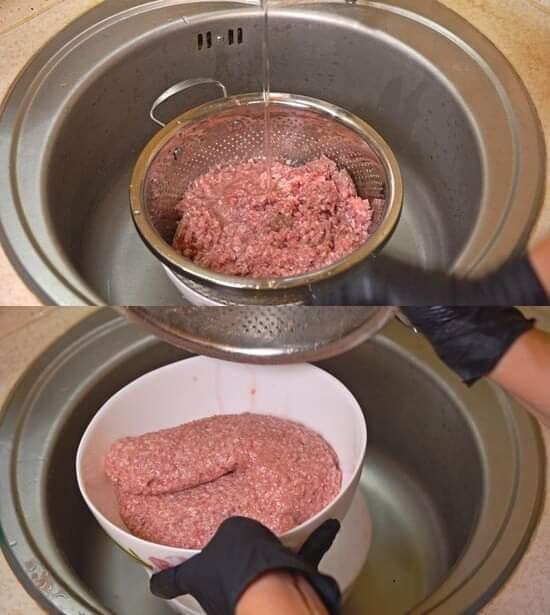ADVERTISEMENT
**Title: Is It Necessary to Wash Ground Beef Before Cooking?**
Ground beef is one of the most popular ingredients used in kitchens worldwide. From burgers to spaghetti, tacos, meatloafs, and meatballs, ground beef is versatile, delicious, and a staple in countless dishes. However, one question often arises when it comes to handling ground beef in the kitchen: Is it necessary to wash ground beef before cooking it?
This seemingly simple question has sparked debates for years. Some believe washing ground beef is necessary to remove impurities, while others argue that it isn’t required and could actually lead to food safety risks. In this comprehensive article, we’ll explore the science behind washing ground beef, whether it’s safe to do so, and the best practices for handling ground beef to ensure it’s cooked properly and safely.
We’ll also delve into the food safety risks, potential contamination concerns, and best cooking techniques for ground beef to help you make an informed decision about whether or not to wash it before preparing your meal.
### Understanding Ground Beef
Before we answer the question, it’s important to understand what ground beef is and how it’s processed. Ground beef is made by grinding up beef cuts, such as chuck, sirloin, or round. These cuts are typically processed into different lean-to-fat ratios, with common varieties including 80/20 (80% lean, 20% fat) and 90/10 (90% lean, 10% fat). Ground beef is often chosen for its rich flavor and versatility in various recipes.
Once the beef is ground, it’s typically packaged and sold in stores. However, during this processing, there’s the potential for bacteria to be introduced. This is where food safety concerns come into play, and why the question of whether to wash ground beef arises.
### The Case Against Washing Ground Beef
While it may seem logical to wash ground beef before cooking it to remove any contaminants, food safety experts generally advise against it. Here are some key reasons why washing ground beef is not necessary and can even be risky.
#### 1. **Washing Does Not Remove Harmful Bacteria**
The most common concern with ground beef is the potential presence of harmful bacteria like **E. coli**, **Salmonella**, and **Listeria**, which can cause foodborne illnesses. However, washing ground beef doesn’t effectively remove these bacteria.
Washing raw meat, including ground beef, only removes some surface contaminants. Harmful bacteria like E. coli or Salmonella typically reside deep within the meat, especially when ground, which makes it difficult to remove through washing alone. Simply rinsing the meat under water will not kill bacteria that are embedded within the meat fibers.
Instead, these bacteria are only neutralized by cooking the meat to the correct internal temperature. The USDA recommends cooking ground beef to an internal temperature of 160°F (71°C) to kill harmful bacteria and ensure food safety. This is a far more effective way to ensure that any harmful bacteria are eliminated than washing the beef prior to cooking.
#### 2. **Water Splashing and Cross-Contamination Risk**
One of the most significant risks of washing ground beef is the potential for cross-contamination. When you wash raw meat under a running tap, water can splatter and spread bacteria onto surrounding surfaces, including countertops, cutting boards, utensils, and even other foods. The splashing of water can spread harmful microorganisms in your kitchen, increasing the risk of foodborne illnesses.
The U.S. Centers for Disease Control and Prevention (CDC) has repeatedly advised against washing raw meat due to this risk. Even a small amount of water splashed during the washing process can contaminate kitchen surfaces, which could lead to cross-contamination and subsequent illness.
#### 3. **Loss of Flavor and Nutrients**
Ground beef contains natural juices that contribute to the flavor and moisture of the meat. Washing ground beef may result in the loss of some of these valuable juices, which could affect the taste and texture of your dish. Additionally, these juices contain valuable nutrients, such as vitamins and minerals, that are lost during the washing process.
By washing the meat, you essentially discard the flavorful juices that help enhance the overall quality of the cooked dish. This is particularly important in recipes where you want to retain moisture, such as in burgers or meatballs. The best way to preserve the natural flavor and moisture of ground beef is to avoid washing it and focus on proper cooking techniques.
### The Importance of Proper Handling and Cooking
Instead of washing ground beef, food safety experts recommend proper handling and cooking methods to ensure that your ground beef is safe to eat. Here are some key tips for safely preparing ground beef:
For Complete Cooking STEPS Please Head On Over To Next Page Or Open button (>) and don’t forget to SHARE with your Facebook friends
